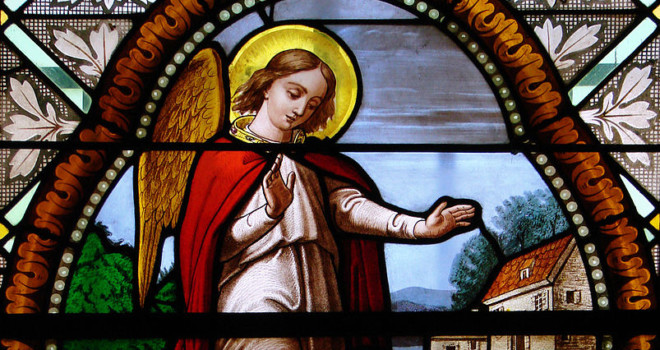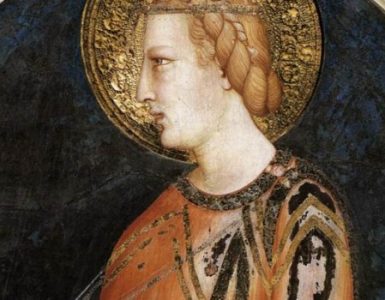Imagine you had a bodyguard who was always with you. He did all the usual bodyguard things like protecting you from danger, warding off assailants, and generally keeping you safe in all situations. But he also did more than this: he offered you moral guidance, helped you become a stronger person, and led you to your ultimate calling in life.
We don’t have to imagine it. We already have such a bodyguard. Christian tradition calls them guardian angels. Their existence is supported by Scripture and both Catholics and Protestants believe in them
But too often we neglect to tap this great spiritual resource. (I, for one, am certainly guilty of this!) In order to better enlist the aid of guardian angels, it might help to have a better appreciation of they can do for us. Here are 20 things:
1. Ward off demons
Sometimes we visualize moral decision-making as a debate between a bad angel whispering in one ear and a good angel speaking wisely in the other. There is a truth to this: according to St. Thomas Aquinas, one of the roles of the guardian angels is to fight off demons (Summa Theologica, Part 1, Question 113, Articles 2-6).
2. Protect us from harm
Guardian angels generally protect us from both spiritual and physical harm, according to Aquinas (Question 113, Article 5, Reply 3). This belief is rooted in Scripture. For example, Psalm 91:11-12 declares, “For he commands his angels with regard to you, to guard you wherever you go. With their hands they shall support you, lest you strike your foot against a stone.”
3. Strengthen us against temptation
Guardian angels do not just ward off evil, they also strengthen us so we can do it ourselves. As St. Bernard says in a sermon, “As often, therefore, as a most serious temptation is perceived to weigh upon you and an excessive trial is threatening, call to your guard, your leader, your helper in your needs, in your tribulation; cry to him and say: ‘Lord, save us; we perish!’”
4. Embolden us
St. Bernard also says that with angels such as these at our side we should have no fear. We should have the courage to live out our faith boldly and confront whatever life might throw our way. As he puts it, “Why should we fear under such guardians? Those who keep us in all our ways can neither be overcome nor be deceived, much less deceive. They are faithful; they are prudent; they are powerful; why do we tremble?”
5. Intervene miraculously to save us from trouble
Guardian angels not only ‘guard,’ they also can save us when we are already in trouble. This is illustrated by the story of Peter in Acts 12, when an angel helps break the apostle out of prison. The story suggests that it is his own personal angel that has intervened (see verse 15). Of course, we cannot count on such miracles. But it’s an added comfort to know that they are possible.
6. Guard us from birth
Church Fathers once debated whether guardian angels were assigned at birth or at baptism. St. Jerome argued decisively for the former. His basis was Matthew 18:10, which is a crucially important Scriptural passage that supports the existence of guardian angels. In the verse Jesus says, “See that you do not despise one of these little ones, for I say to you that their angels in heaven always look upon the face of my heavenly Father.” The reason that we get guardian angels at birth is that their aid is associated with our nature as rational beings, rather than belonging to the order of grace, according to Aquinas (Question 113, Article 5, Answer).
7. Guard all of us—including unbelievers
This conclusion follows from the above. Aquinas also makes this clear in explaining that God never leaves any of us, including sinners. As the great dogmatic theologian Ludwig Ott explained, “According to the general teaching of the theologians, however, not only every baptized person, but every human being, including unbelievers, has his own special guardian angel from his birth.” Pope Benedict XVI also taught that guardian angels are “ministers of the divine care for every human being.” (Thanks to Jimmy Akin for highlighting these sources.)
8. Remind us of the dignity of persons
This follows from all that has been said before. It is particularly evident from Matthew 18:10 where Jesus instructs us not to ‘despise’ the ‘little ones’ because they have angels watching over them. (I’m particularly indebted to Protestant preacher John Piper for pointing this out.) As St. Jerome puts it, “The worth of souls is so great that from birth each one has an angel assigned to him for protection.” Piper emphasizes how the presence of guardian angels should lead us to a greater respect for our fellow Christians: “Therefore don’t despise this simple, unimpressive disciple of Jesus! Let his angelic entourage remind you whose son he is.”
9. Remind us of God’s care for all
Aquinas explains how the angels operate in accordance with God’s providential plan for all men (Question 113, Article 6, Answer). It follows that these angels serve as a reminder of His care for us.
10. Bring our needs to God
Akin says that guardian angels act as intercessors who bring our requests directly to God based on Jesus’ words in Matthew 18:10 about angels beholding the face of God.
11. Bring us closer to God
It follows from the above that guardian angels also aid in bringing us nearer to God. Even when God seems distant, just remember that the guardian angel assigned to you personally is at the same time beholding God directly, as the Catholic Encyclopedia notes.
12. Move us to the good
Guardian angels also move us to the good. As Aquinas writes, “It is moreover manifest that as regards things to be done human knowledge and affection can vary and fail from good in many ways; and so it was necessary that angels should be deputed for the guardianship of men, in order to regulate them and move them to good” This includes prompting us to perform good works, according to Aquinas. (See Question 113, Article 1, Answer and Article 4, Objection 3.)
13. Reinforce God’s commands
According to Aquinas, one of the roles of our angelic guardians is helping us use our reason to pursue virtue. In particular, he says the angels help us in developing prudence by serving as God’s “universal instructor,” passing on God’s precepts (Question 113, Article 1, Reply 2).
14. Illuminate the truth
Angels “propose the intelligible truth to men” through sensible things, according to Aquinas (Question 111, Article 1, Answer). Although he does not elaborate on this point, this it is a basic teaching of the Church that the material world points to invisible spiritual realities. As St. Paul says in Romans 1:20, “Ever since the creation of the world, his invisible attributes of eternal power and divinity have been able to be understood and perceived in what he has made.”
15. Strengthen our minds
A second way that angels enlighten us, Aquinas says, is by reinforcing our intellects. As he puts it, “[T]he human intellect as the inferior, is strengthened by the action of the angelic intellect” (Question 111, Article 1).
16. Communicate through our imagination
In addition to working through our senses and intellects, our guardian angels also influence us through our imaginations, according to Aquinas, who gives the example of Joseph’s dreams (Question 111, Article 3, On the Contrary and Answer). But it might not be something as obvious as a dream; it could also be through more subtle means like a ‘phantasm,’ which could be defined as an image brought to the senses or the imagination (Question 111: Article 1, Answer; definition adapted from the Dictionary of Scholastic Philosophy by Bernard Wueller, SJ).
17. Influence our wills
Angels cannot directly move the will, but, according to Aquinas, they can indirectly influence it through our senses and intellect, as stated above (Question 111, Article 2 , Answer). This means that our guardian angels influence every part of our being for the better—our senses, intellect, and will.
18. Aid in our salvation
The ultimate goal of all that guardian angels do is to aid in our salvation, according to Aquinas. “Angels are sent to minister, and that efficaciously indeed, for those who shall receive the inheritance of salvation, if we consider the ultimate effect of their guardianship, which is the realizing of that inheritance,” Aquinas writes (Question 113, Article 5, Reply 1). Here he is drawing from Hebrews 1:14, which states, “Are they not all ministering spirits sent to serve, for the sake of those who are to inherit salvation?”
19. Remind us of our ultimate goal
Inspired by Christ’s words in Matthew 18:10, St. Augustine suggests that guardian angels remind us that our ultimate goal is the beatific vision of God: “As, then, they see, so shall we also see; but not yet do we thus see. Wherefore the apostle uses the words cited a little ago, Now we see through a glass, darkly; but then face to face. This vision is reserved as the reward of our faith; and of it the Apostle John also says, When He shall appear, we shall be like Him, for we shall see Him as He is. 1 John 3:2. By the face of God we are to understand His manifestation, and not a part of the body similar to that which in our bodies we call by that name” (City of God, Book 22, Chapter 29).
20. Never leave us
Guardian angels assume their duties at our birth and maintain them up to our death. For Aquinas, this is just an extension of the broader truth that we never completely leave God’s care, even in sin and doubt: “Now it is evident that neither man, nor anything at all, is entirely withdrawn from the providence of God: for in as far as a thing participates being, so far is it subject to the providence that extends over all being. God indeed is said to forsake man, according to the ordering of His providence, but only in so far as He allows man to suffer some defect of punishment or of fault. In like manner it must be said that the angel guardian never forsakes a man entirely…” (Question 113, Article 6, Answer).
image: By Vassil [Public domain], from Wikimedia Commons












